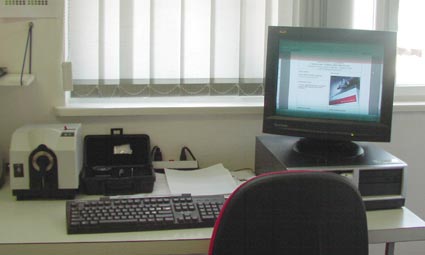|
Name of equipment: |
Spectrophotometer Spectraflash SF 300 |
|
Purpose: |
Software guided remission spectrophotometer aimed of measuring colour parameters of textile, plastic, metal or paper substrates; aimed of measuring whiteness and fluorescent colours; aimed of performing the computer matching. |
|
Model, type, country of origin: |
SF 300, Datacolor, Switzerland |
|
Technical characte-ristics: |
– software guided
– automatic zoom-lens and UV control – two sizes of measuring aperture: R=0,65 cm; R=2,2 cm – possibility of computer matching – three basic light sources – power supply: 220V – measuring range: 360 – 700nm |
| Year of origin: 2002
Figure:
|
|
|
Method of |
Sample is placed and fixed with a special holder against the measuring aperture of the instrument. The sample is highlighted from the light source placed inside the instrument. Instrument measures the wavelengths of reflected and absorbed parts of the incident light. Measured data are stored into computer database and can be used by the special computer software for sorting and calculating the values of colour parameters necessary for defining colour, whiteness or computer colour matching. |
|
Department, |
Department for Textile Chemistry and Ecology, Colorimetry Laboratory, Savska cesta 16/9 |
| Addition note: The corresponding standards: ISO 105 – Tests for colour fastness HRN EN ISO 105-B06; Textiles — Tests for colour fastness — Part B06: Colour fastness and ageing to artificial light at high temperatures: Xenon arc fading lamp testing (ISO 105-B06:1998, including Amendment 1:2002; EN ISO 105-B06:2004) HRN EN ISO 105-C12; Textiles — Tests for colour fastness — Part C12: Colour fastness to industrial laundering (ISO 105-C12:2004; EN ISO 105-C12:2006) HRN EN ISO 105-E05; Textiles — Tests for colour fastness — Part E05: Colour fastness to spotting: Acid (ISO 105-E05:2006; EN ISO 105-E05:2006) HRN EN ISO 105-E06; Textiles — Tests for colour fastness — Part E06: Colour fastness to spotting: Alkali (ISO 105-E06:2006; EN ISO 105-E06:2006) HRN EN ISO 105-G01/AC; Textiles — Tests for colour fastness — Part G01: Colour fastness to nitrogen oxides (ISO 105-G01:1993; EN ISO 105-G01:1995/AC:1996) HRN EN ISO 105-J03; Textiles — Tests for colour fastness — Part J03: Calculation of colour differences (ISO 105-J03:1995, including Technical Corrigendum 1:1996; EN ISO 105-J03:1997) HRN EN ISO 105-N05; Textiles — Tests for colour fastness — Part N05: Colour fastness to stoving (ISO 105-N05:1993; EN ISO 105-N05:1995) HRN EN ISO 105-P01; Textiles — Tests for colour fastness — Part P01: Colour fastness to dry heat (excluding pressing) (ISO 105-P01:1993; EN ISO 105-P01:1995) HRN EN ISO 105-P02; Textiles — Tests for colour fastness — Part P02: Colour fastness to pleating: Steam pleating (ISO 105-P02:2002; EN ISO 105-P02:2004) HRN EN ISO 105-S03; Textiles — Tests for colour fastness — Part S03: Colour fastness to vulcanization: Open steam (ISO 105-S03:1993; EN ISO 105-S03:1995) HRN EN ISO 105-X07; Textiles — Tests for colour fastness — Part X07: Colour fastness to cross-dyeing: Wool (ISO 105-X07:1994; EN ISO 105-X07:1997) HRN EN ISO 105-X10; Textiles — Tests for colour fastness — Part X10: Assessment of migration of textile colours into polyvinyl chloride coatings (ISO 105-X10:1993; EN ISO 105-X10:1995) HRN EN ISO 105-Z05; Textiles — Tests for colour fastness — Part Z05: Determination of the dusting behaviour of dyes (ISO 105-Z05:1996; EN ISO 105-Z05:1998 |
|

